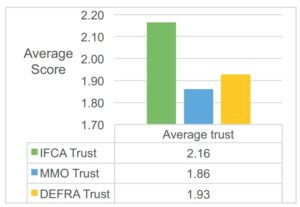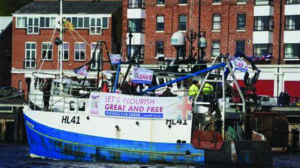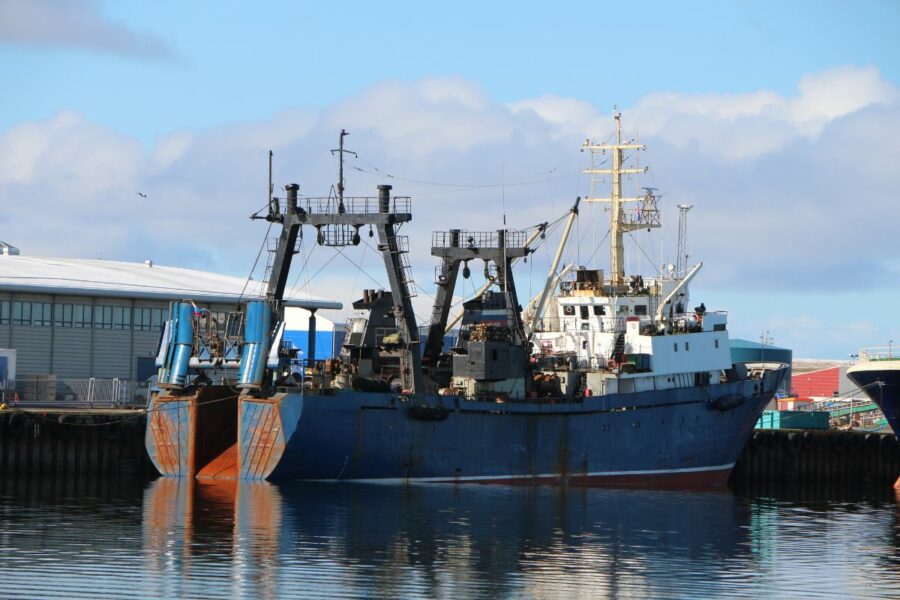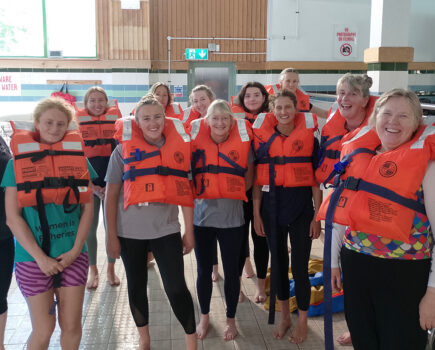Research reveals breakdown in relations between fishermen and regulators

Max Dixon.
Masters student Max Dixon featured earlier this year in the pages of FN (Fishing News, 21 July, ‘Do you trust the institutions that govern UK fisheries?’), when he asked English fishermen to respond to an anonymous survey he had devised as part of his efforts to quantify the relationships between fishermen and regulators of all types.
He promised then to come back with a summary of his work, submitted as a thesis for his Masters degree, which has a stark message for regulators about the state of their relationship with the fishing industry.
One anonymous fisher told him: “That trust is gone. And I don’t see how they can govern without the trust of the industry long-term.”
Max Dixon told Fishing News: “I would first like to thank the many fishers who submitted a response to the survey link, whether through this publication or through another source. Your responses were very helpful, and painted a worrying picture of the dire situation in the governance of English fisheries.

Average trust score of each institution. The scores represent the average of the Likert scale score, with 1 being ‘strongly disagree’ and 5 being ‘strongly agree’.
“It is clear from your responses that your trust in government institutions is low across the board. None of the institutions: the Inshore Fisheries and Conservation Authorities (IFCAs), the Marine Management Organisation (MMO) nor the Department of Environment, Food and Rural Affairs (Defra) received a positive trust score in any of the IFCA regions, and the general sentiment in the survey comments are summed up with statements like: ‘corrupt and underhanded’ and ‘commonly known as the marine mismanagement organisation’.
“Your responses did indicate a slightly higher degree of trust in the IFCAs (see the table), although a score of 2.15 still suggests overall dissatisfaction with their performance. By analysing the individual statement responses, this can be attributed to the IFCAs being seen as slightly more effective and competent, slightly easier to communicate with, and slightly more reputable than the MMO and Defra.
“The responses show that the MMO is seen to have issues with transparency and in acting in the best interests of the fishers, whilst it did, however, score well for ease of communication and technical competence. Defra similarly scored badly on acting in the best interests of fishers, but is seen to be more reputable.
“Alongside the survey, I also conducted a number of detailed interviews with fishers from Yorkshire and East Anglia. While this sample is clearly not representative, I was able to collect some interesting perspectives and deduce the depth of the lack of trust in the North Eastern IFCA region in particular.
“There are several main takeaways from the interviews, the first being that the IFCAs have an issue with enforcement, which is seen as being arbitrary or overzealous. One fisher said: “It’s always about the stick, and they’re saying that fishermen are always trying to do something wrong. It’s not effective, and it’s causing the bad relationship with the industry.” This demonstrates how the issue of enforcement affects governance more broadly.
“The MMO is largely seen as becoming more distant and detached from fishers. An anonymous fisher stated that: “When I want a quick decision on whether to take a boat… it takes forever now,” and with the MMO handling licensing, this fuels anxiety. “It’s very, very scary – very scary. You can lose a lot of money.”
“There was some regional variation demonstrated in the survey. In the North East, the MMO was rated as slightly more trustworthy than the local IFCA. This was reversed for regions such as Eastern and Cornwall: however, the scores were still negative, and the responses for the Eastern IFCA were very split, with many responses either ‘strongly disagree’ or ‘strongly agree’.
“In the NEIFCA region there is deep distrust of Defra, and the official narrative around the mass mortality event. One fisher stated: “They treated us with contempt, spoke down to us, they were condescending, and they aren’t fit for purpose. A lot of them want sacking.” Another said: “… there has been a total disregard from Defra with respect to fishers’ perspectives – they’ve completely sided on the side of trying to go against the fishers.”
“The scepticism seems to be justified if a recent report by Open Democracy is to be believed. This suggests that there was an attempt to downplay the role human activity, such as the Tees dredging, might have played in the mass mortality of crabs and lobsters.

A fishermen’s protest in support of Brexit. The widespread support for leaving the EU among fishermen can be seen as evidence of the lack of trust in the EU to effectively govern fisheries.
“I also asked some of the fishers I interviewed what they expected or hoped for from the post-Brexit reforms of the fisheries governance system, and the answers were not inspiring. Many had not heard of the consultation process and responded with answers like: “No doubt it will include more MPAs, more no-take zones, more this, more that, more other, more dredging.”
“You can see from these results that trust is very low across the institutions and the regions of England. Fishers do not trust the institutions that govern them. This should be deeply concerning for the regulators, especially with the post-Brexit system of governance that is to be announced in November with the Joint Fisheries Statement.
“There were many things I would like to explore further, such as fishers’ perspectives on how to improve governance of fisheries, and whether this is possible with better engagement by the institutions, or through increased democratic decision-making.
“Possibly fisheries governance requires a complete overhaul. As one fisher remarked to me: “If they wanted to really help… scrap the lot. Rewrite it from day one to help our fishermen.”
The full report is available by contacting Max Dixon at: maximilian.dixon.21@ucl.ac.uk
This story was taken from the latest issue of Fishing News. For more up-to-date and in-depth reports on the UK and Irish commercial fishing sector, subscribe to Fishing News here or buy the latest single issue for just £3.30 here.








